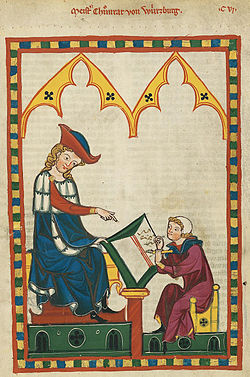music.wikisort.org - Poet
Konrad von Würzburg (c.1220-1230 – 31 August 1287)[1] was the chief German poet of the second half of the 13th century.
This article needs additional citations for verification. (January 2021) |

As with most epic poets of the age, little is known of his life, but he is assumed to be a native of Würzburg. He seems to have spent part of his life in Strasbourg and his later years in Basel, where he died.[1] Like his master, Gottfried von Strassburg, Würzburg did not belong to the nobility, from which most of the poets of the time sprang. His varied and voluminous literary work is comparatively free from the degeneration which set in so rapidly in Middle High German poetry during the 13th century.[2]
According to the Encyclopædia Britannica Eleventh Edition, "[h]is style, although occasionally diffuse, is dignified in tone; his metre is clearly influenced by Gottfried's tendency to relieve the monotony of the epic-metre with ingenious variations, but it is always correct; his narratives—if we except Die halbe Birn, of which the authorship is doubtful—are free from coarseness, to which the popular poets at this time were prone, and, although mysticism and allegory bulk largely in his works, they were not allowed, as in so many of his contemporaries, to usurp the place of poetry."[2]
Würzburg wrote a number of legends (Alexius, Silvester, Pantaleon) illustrating Christian virtues and dogma; Der Welt Lohn, a didactic allegory on the familiar theme of Frau Welt, the woman beautiful in front, unsightly and loathsome behind. Die goldene Schmiede is a panegyric of the Virgin Mary; the Klage der Kunst, an allegorical defence of poetry.[2]
His most ambitious works are two enormously long epics, Der trojanische Krieg[3] (of more than 40,000 verses, which still left the work unfinished) and Partenopier und Meliur, both of which are based on French originals. Würzburg's powers are to be seen to best advantage in his shorter verse romances, such as Engelhart und Engeltrut, Kaiser Otto and Das Herzemaere; the last mentioned, the theme of which has been made familiar to modern readers by Uhland in his Kastellan von Coucy, is one of the best poems of its kind in Middle High German literature.[2]
There is no uniform edition of Würzburg's works. Some examples are:
- Der trojanische Krieg was edited by A von Keller for the Stuttgart Literarische Verein (1858)
- Partonopier und Meliur, by K Bartsch (1871)
- Die goldene Schniede and Silvester, by W Grimm (1840 and 1841)
- Alexius, by HF Massmann (1843) and R Haczynski (1898)
- Der Welt Lohn, by F Roth (1843)
- Engelhart und Engeltrut, by Moritz Haupt (1844, 2nd ed., 1890)
- Klage der Kunst, by E Joseph (1885).[2]
The shorter poems, Otto and Herzemaere, can be found in Erzählungen und Schwänke des Mittelalters, edited by H Lambel (2nd ed., 1883). Later German translations of Würzburg's most popular poems were published by K Pannier and H Kruger in Reclams Universalbibliothek (1879-1891).[2]
On Würzburg see F Pfeiffer in Germania, iii (1867), and W Goither in the Allgemeine deutsche Biographie, vol. 44 (1898), s.v. Würzburg, Konrad von.[2]
References
- Randel Don (1996). The Harvard Biographical Dictionary of Music. Harvard University Press. p. 460. ISBN 978-0-674-37299-3.
- Chisholm 1911.
- Konrad (von Würzburg) (1858). Der trojanische Krieg (in German). Litterarischer Verein. p. 9.
- This article incorporates text from a publication now in the public domain: Chisholm, Hugh, ed. (1911). "Conrad of Würzburg". Encyclopædia Britannica. Vol. 6 (11th ed.). Cambridge University Press. p. 968.
External links
- Works by or about Konrad von Würzburg at Internet Archive
- A German translation of his text "Der Welt Lohn"
- Herbermann, Charles, ed. (1913). . Catholic Encyclopedia. New York: Robert Appleton Company.
На других языках
- [en] Konrad von Würzburg
[es] Konrad von Würzburg
Konrad von Würzburg (circa 1220 - 31 de agosto de 1287) fue un poeta alemán durante la segunda mitad del siglo XIII.[fr] Konrad von Würzburg
Konrad von Würzburg (mort le 31 août 1287), est un poète allemand, une des figures majeures de la littérature allemande de seconde moitié du XIIIe siècle. Il est cité comme l’un des douze maîtres-chanteurs (Meistersinger) aux côtés de Walther von der Vogelweide.[ru] Конрад фон Вюрцбург
Ко́нрад фон Вю́рцбург, Конрад Вюрцбургский (ср.-в.-нем. Konrad von Würzburg; 1220/1230 — 31 августа 1287) — немецкий миннезингер и писатель-дидактик.Другой контент может иметь иную лицензию. Перед использованием материалов сайта WikiSort.org внимательно изучите правила лицензирования конкретных элементов наполнения сайта.
WikiSort.org - проект по пересортировке и дополнению контента Википедии